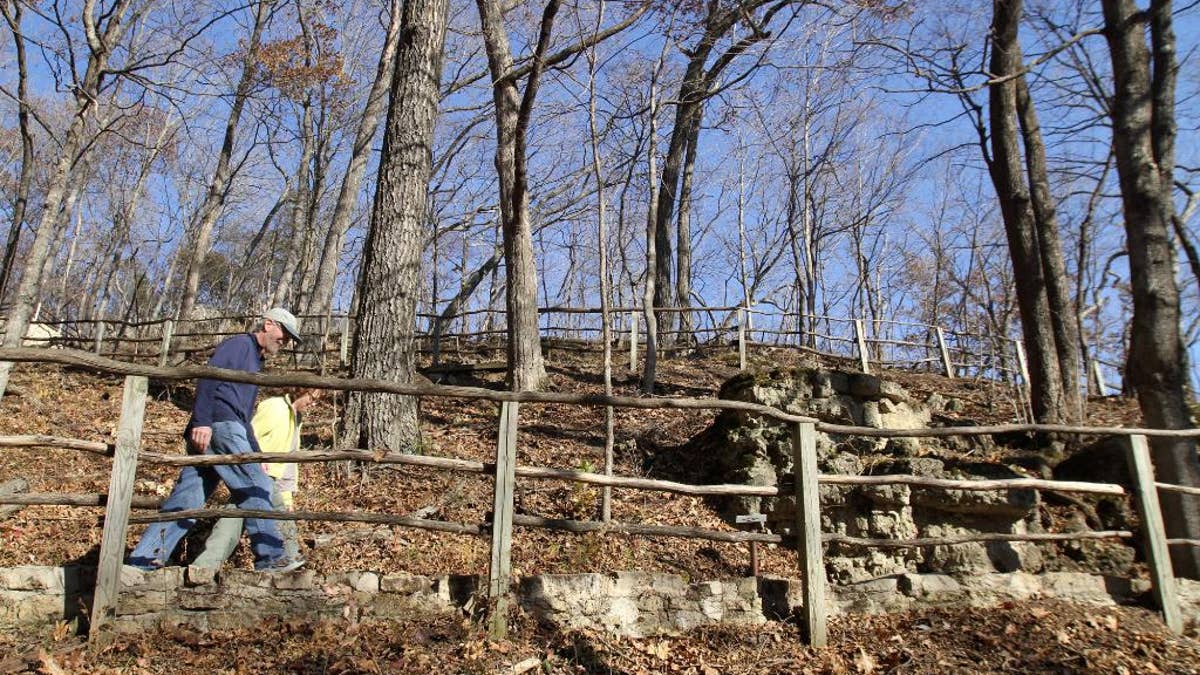
FILE - In this Nov. 8, 2010 file photo, Paul and Sue Schramm, of Dyersville, Iowa, hike one of the trails at Effigy Mounds National Monument in Harpers Ferry, Iowa. The National Park Service has shelved a blistering internal report that details a “decade of dysfunction” as the agency allowed dozens of illegal construction projects to cause significant damage to an ancient Iowa burial ground that Indian tribes consider sacred. (Justin Hayworth/The Des Moines Register via AP, file) NO SALES, MAGS OUT, TV OUT, MANDATORY CREDIT (The Associated Press)
IOWA CITY, Iowa – The National Park Service has shelved a blistering internal report that details a "decade of dysfunction" as the agency allowed dozens of illegal construction projects to cause significant damage to an ancient Iowa burial ground that Indian tribes consider sacred.
Titled "Serious Mismanagement Report," the document blasts the park service's failed stewardship of the Effigy Mounds National Monument from 1999 to 2010 and says the case should serve as a wakeup call for agency employees at all levels to avoid similar violations.
Last week, NPS deputy regional director Patricia Trap told a resident who requested a copy of the 15-page report that it didn't exist. She later told The Associated Press that it did exist but hadn't been "agency approved." She said the document will contribute to — but be replaced by — another review that is looking at the root causes of problems as well as what went right during that time.
Critics say the agency is trying to suppress the harsh report to soften its findings.
"They're trying to avoid accountability, which goes all the way to the director. That's why this report 'doesn't exist'," said Jeff Ruch, executive director of Public Employees for Environmental Responsibility, which helped uncover the damaging projects. "Apparently, the park service doesn't want a wakeup call."
The monument, in northeast Iowa along the Mississippi River, includes more than 200 ceremonial and burial mounds that are considered sacred to the descendants of the builders, who are affiliated with numerous tribes.
The report says 78 construction projects costing a total of $3.4 million were approved there in violation of federal laws meant to protect archaeological resources and historic sites. The construction of boardwalks, bridges, roads and a damaged land around the mounds, and many had a "complete lack of compliance" as employees failed to conduct the mandatory environmental reviews and tribal consultation. shed
The report was written by a four-person review team led by National Park Service special agent David Barland-Liles, who conducted a lengthy criminal investigation into the violations. The U.S. Attorney's Office in Cedar Rapids declined to charge then-superintendent Phyllis Ewing and monument maintenance chief Tom Sinclair with violating the Archaeological Resources Protection Act in 2012 after concluding the agency's "weak and inappropriate initial response" undermined a criminal case and would make them sympathetic defendants, the report reveals.
NPS officials at the Midwest Regional Office in Omaha ignored employees who repeatedly went to them with evidence of mismanagement and failed to take action despite numerous other warning signs, the report says. Monument officials routinely misinformed regional administrators, who didn't follow up even when told of compliance problems.
"When oversight was finally provided, a decade of dysfunction was uncovered," the report says.
Ewing remained "willfully blind" to the laws in question and ignored and retaliated against monument employees who raised concerns, hurting the lives and careers of two valuable workers who left, the report said. Sinclair had an "inherent conflict of interest" because he was in charge of both completing projects and reviewing compliance.
"(Both) had an inexcusable lack of understanding of the fundamental importance of the archaeological resource they were assigned to protect, along with its complexity, pervasiveness, landscape qualities and history, which enabled them to discount concerns and justify gross physical and ethical violations of a site held sacred by many," the report says.
Ewing was transferred in 2010 after the agency learned of problems, then fired last year before the release of Barland-Liles' 700-page criminal investigation report. She is suing the agency for wrongful termination, claiming she was made a scapegoat.
The "Serious Mismanagement Report," dated April 2014, recently became public when an employee provided a copy to Timothy Mason, an activist with Friends of Effigy Mounds.
Mason asked Trap, the regional NPS official, for a copy last week. She responded, "Simply put, there is no such agency report."
Trap defended that denial to the AP, saying it isn't an "agency report" because administrators didn't approve the document. She said the agency instead has asked other employees from outside the region to conduct a separate review of the lessons learned at Effigy Mounds. She said that report will be completed and released this year.
She said the "Serious Mismanagement Report" was well-intentioned but team members were too close to the investigation and represented a narrow viewpoint. She said she took issue with the title.
"I'm not denying some serious mismanagement," she said. "But also there were actions taken along the way that were actually appropriate management."
___
Follow Ryan J. Foley on Twitter at https://twitter.com/rjfoley









































